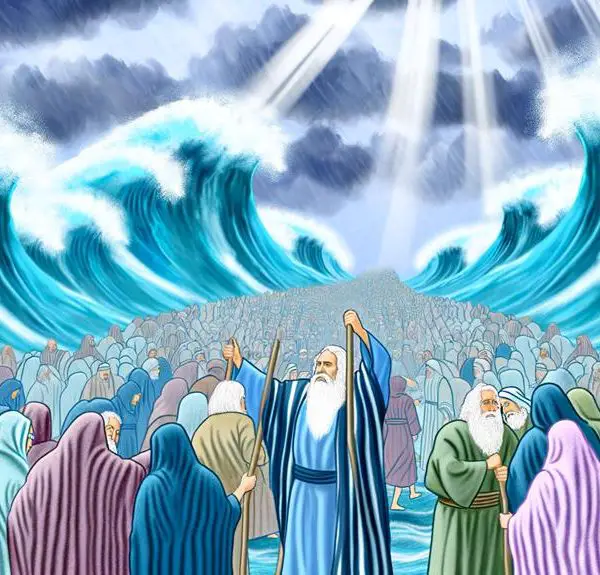Take a deep dive into Genesis 6, exploring Noah's righteousness, divine remorse, and the consequences of unchecked sin in this compelling Bible study.

Bible Study – The Book of Genesis – Chapter 6 – Summary and Analysis
In Genesis 6, mankind's escalating wickedness propels God to regret His creation and resolve to cleanse the Earth via a flood. Yet, there's Noah – a beacon of righteousness amid corruption, finding divine favor, demonstrating the importance of moral integrity. He obediently constructs an Ark under God's guidance, symbolizing faith and Divine mercy. The chapter prompts reflection on consequences of unchecked sin and the value of righteous living. It's worth exploring Noah's character, divine remorse, God's judgment, and the redemptive promise through continuing your journey into the text's depths.
Key Takeaways
- Genesis 6 depicts escalating human wickedness, leading to divine regret and the decision for a cleansing flood.
- Noah stands out for his righteousness amidst corruption, earning God's favor and the task of building the Ark.
- The Ark's construction represents Noah's obedience and faith, and signifies God's mercy in preserving life.
- The chapter introduces the theme of divine punishment, sinful humanity, God's mercy, obedience to God, and the promise of redemption.
- Differing interpretations exist regarding the 'Sons of God', 'daughters of men', nature of Noah's righteousness, and the scale of the flood.
Contextual Background of Genesis 6

Delving into the contextual background of Genesis 6, you'll find a world teetering on the brink of divine judgement, marked by escalating human wickedness and corruption. The Genesis 6 timeline unfolds in an era where morality seems to be in a free fall, with God's creation becoming increasingly perverted and degraded.
The cultural significance of this chapter cannot be overstated. It represents a crucial shift in the biblical narrative, where God's patience with humanity reaches its limit, setting the stage for the cataclysmic flood. It's a sobering reminder of the consequences of unchecked sin and the importance of righteous living.
In studying this chapter, understanding the broader societal context is crucial, which was characterized by widespread corruption and disregard for God's laws. The narrative offers a grim picture of humanity's state, with divine judgement looming as the inevitable response to their collective wickedness.
Key Characters in Chapter 6
As you explore Genesis Chapter 6, you'll encounter several key figures, their attributes, and actions that shape the narrative. These include Noah, noted for his righteousness, and God, who expresses regret and makes a significant decision. You'll also encounter the notion of the Ark's construction, a symbol of salvation in the midst of impending judgment.
Noah's Righteousness Explored
In the midst of societal corruption and wickedness, Noah emerges in Genesis Chapter 6 as a beacon of righteousness, setting a moral standard that's worth your careful exploration. Noah's integrity shines brightly in this chapter, distinguishing him from his contemporaries. He exhibits unwavering moral uprightness, which earns him divine favoritism. While others succumb to societal decay, Noah's righteousness remains steadfast, presenting a compelling contrast.
This divine favoritism is significant. Unlike his peers, Noah finds favor in the eyes of God, underscoring the significance of his integrity. This is a reflection of the profound impact of personal righteousness in a world overshadowed by moral decline. Hence, your study of Noah's righteousness offers insightful lessons on maintaining personal integrity amidst prevailing societal corruption.
God's Regret and Decision
While you're contemplating Noah's moral uprightness, it's equally important to ponder the divine perspective presented in Genesis Chapter 6, particularly focusing on God's regret and ensuing decision. The Divine remorse, a profound theological concept, is triggered by human wickedness, reflecting the depth of human corruption.
Here is a table to illustrate God's sentiment:
God's Sentiment |
Trigger |
Outcome |
|---|---|---|
Divine remorse |
Human wickedness |
Decision to eradicate mankind |
Mercy |
Noah's righteousness |
Decision to save Noah and his family |
Justice |
Corruption on earth |
Decision for a fresh start |
Sorrow |
Death of His creation |
Promise never to curse the ground again |
Satisfaction |
Noah's sacrifice after the flood |
Promise never to destroy all living creatures |
This chapter underscores the divine-human relationship's complexity and sets the stage for God's redemptive plan.
The Ark's Construction
Despite the prevailing chaos, God's mercy shines through in His decision to preserve Noah and his family, setting in motion the construction of the Ark – a monumental endeavor that underscores Noah's obedience and trust in the Divine plan. The Ark's durability is a primary focus in this narrative, highlighting the significance of God's prescribed building materials and their sourcing. Gopher wood and pitch, elements both strong and resilient, are used, symbolizing the need for unwavering faith amidst life's storms. The Ark is a formidable proof to God's provision and Noah's steadfast obedience. Sourcing these materials likely posed challenges but ultimately underscored Noah's trust in God's instructions. This episode emphasizes how faith, obedience, and reliance on the Divine can result in miraculous preservation.
Summary of Genesis Chapter 6
Diving into the depths of Genesis Chapter 6, you'll uncover a tale marred by mankind's corruption and God's ensuing decision to cleanse the earth. The chapter opens with the proliferation of human corruption, so rampant that God decides upon a drastic course of action. This is where Global Flood Theories originate, as God resolves to send a flood to purge the earth.
However, there's a glimmer of hope. Noah, a righteous man, finds favor in God's eyes. He's chosen to build an ark, ensuring the survival of his family and a selection of animals. This plan sets the stage for God's covenant with Noah – a promise of humanity's future survival.
To aid your understanding, consider this table summarizing the key points:
Section |
Summary |
|---|---|
Mankind's Corruption |
Humans' wickedness provokes God's decision to send a flood. |
Global Flood Theories |
God's plan to cleanse the earth introduces the concept of a global flood. |
Noah's Righteousness |
Noah, a virtuous man, is chosen to build the ark. |
God's Covenant with Noah |
God makes a promise to Noah, ensuring the continuity of life post-flood. |
In this chapter, you'll see divine judgment intertwined with divine mercy, a demonstration of the complexity of God's character.
Detailed Verse-by-Verse Analysis

Now, let's shift our focus to a meticulous verse-by-verse analysis of Genesis Chapter 6. You'll interpret not only the divine instructions given but also Noah's faithful obedience to these directives. This systematic approach will help you gain a broader, more nuanced understanding of the narrative and its theological implications.
Interpreting Divine Instructions
In our verse-by-verse analysis, you'll see how the divine instructions in Genesis Chapter 6 are not only significant, but they also require careful interpretation to fully grasp their implications. The concepts of Divine Communication and Spiritual Perception are pivotal here.
Divine Communication |
Spiritual Perception |
|---|---|
God's instructions to Noah |
Noah's understanding of instructions |
Detailed blueprint of the Ark |
Perceiving dimensions spiritually |
Directive for family and animals |
Deciphering divine instructions |
Warning about the flood |
Comprehending the gravity of the situation |
Promise of Covenant |
Trust in God's promise |
Divine Communication isn't about mere words; it's about a spiritual interaction with God. Spiritual Perception is about understanding and responding to that interaction appropriately. It's a dynamic process, requiring a deep spiritual understanding to interpret divine instructions accurately.
Noahs Faithful Obedience
Pivoting towards Noah's faithful obedience, you'll observe how his unwavering adherence to God's instructions, highlighted verse by verse, demonstrates an exemplary portrait of trust and obedience in divine guidance. This obedience impact is clearly evident in his dutiful construction of the Ark, despite society's mockery. Noah's legacy is deeply intertwined with his obedience, creating a profound affirmation to his faith. The narrative affirms that Noah 'did everything just as God commanded him' (Genesis 6:22), an assertion reinforced through repetition, underscoring his unwavering fidelity to God's command. His obedience, despite societal norm, is a confirmation to his faith and God's trust in him. This analysis underscores how Noah's obedience serves as a paradigm for faithful adherence to divine instruction, shaping his influence.
Major Themes and Symbolism
Often, you'll find that Genesis Chapter 6 is laden with significant themes and symbolism that demand meticulous dissection and thoughtful interpretation. Two standout themes are Divine Punishment and Sinful Humanity.
The notion of Divine Punishment is abundantly clear as God, dismayed by the rampant wickedness of humanity, decides to cleanse the earth through a great flood. It's a potent reminder of God's authority and the consequences of straying from His path.
Sinful Humanity is another key theme. The corruption and moral decay of mankind, as depicted, underscore the human capacity for evil when unrestrained by divine laws.
To encapsulate these themes and their symbolic representations, consider the following table:
Theme |
Symbolism |
Biblical Text |
|---|---|---|
Divine Punishment |
The Flood |
Genesis 6:7 |
Sinful Humanity |
Wickedness of Man |
Genesis 6:5 |
God's Mercy |
Noah's selection |
Genesis 6:8 |
Obedience to God |
Building of the Ark |
Genesis 6:22 |
Promise of Redemption |
Covenant with Noah |
Genesis 6:18 |
In essence, Genesis 6 is a profound study of divine judgement, human fallibility, and the enduring promise of salvation.
Contemporary Relevance of Genesis 6

Despite being an ancient text, you'll find that Genesis 6 holds striking relevance in today's world, providing timeless lessons on morality, obedience, and divine judgement. The Modern Relevance of Genesis 6 can be seen in various facets of our contemporary life.
- It serves as a Societal Reflection, highlighting the consequences of widespread corruption and degradation of moral values. This is akin to the escalating societal decay we often witness today, reminding us to uphold moral integrity.
- The story of Noah's Ark is an allegory for obedience and faith in divine instructions, a lesson that holds true today as we navigate the stormy seas of life's challenges.
- The divine judgement portrayed in Genesis 6 is a metaphor for the repercussions of our actions, emphasizing the universal principle of cause and effect that still resonates in the present day.
In a detailed, scholarly analysis, Genesis 6 is not just an ancient narrative; it's a mirror reflecting our modern society's state and a guide directing us towards moral, obedient, and accountable living. This underlines the enduring power of sacred texts, establishing their relevance across time and cultures.
Differing Interpretations and Perspectives
Over time, you'll find that interpretations of Genesis 6 have varied greatly, reflecting differing cultural contexts, theological perspectives, and scholarly insights. These interpretation disparities underscore the rich complexity of this biblical text.
In the domain of Genesis controversies, one primary point of divergence arises from the intriguing passage about the 'sons of God' and the 'daughters of men'. Some traditions identify these 'sons of God' as fallen angels, while others interpret them as the lineage of Seth, juxtaposed with the ungodly lineage of Cain represented by the 'daughters of men'.
Another contentious issue centers around the character and nature of Noah. He's portrayed as a righteous man in Genesis, but interpretations differ on the extent and implications of his righteousness. Some theologians argue that Noah's righteousness was absolute, while others maintain it was relative to his generation.
The Flood itself is another contentious point. Some scholars interpret it as a local event, while others insist on its global scale.
These disparities in interpretation foster a dynamic dialogue within biblical scholarship and indicate the enduring relevance of Genesis 6. As you explore further, you'll appreciate the multifaceted dimensions of this ancient text and its capacity to inspire ongoing inquiry and reflection.
Reflection and Personal Application

In light of these varied interpretations, it's essential for you to reflect on Genesis 6 and discern what personal insights you can glean from it. This chapter, filled with divine judgements and Noah's faith-filled obedience, brings many important themes to the fore that can be applied to your personal faith journey.
- Consider God's sorrow over the wickedness of humanity, yet His grace in preserving Noah and his family. How does this resonate with your understanding of God's character?
- Reflect on Noah's unwavering obedience in the face of societal corruption. How can his faithfulness inspire you in your own walk with God?
- Analyze the implications of the great flood for understanding divine judgement and mercy. What does this tell you about God's justice and love?
Engaging in a Biblical Worldview Analysis can help you to align your perspectives with those of the Bible. By doing so, you'll be in a better position to apply the truths from Genesis 6 to your daily life, thereby deepening your faith and understanding of God's Word. Remember, Bible study isn't just about gaining knowledge, but it's meant to transform your life.
Frequently Asked Questions
What Are Some Common Misconceptions About Genesis Chapter 6?
You may think Genesis chapter 6 is all literal, but that's not always the case. For instance, Nephilim interpretations vary greatly; they're not necessarily giants or fallen angels. Also, the flood isn't just a historical event, it's loaded with symbolism. It represents a divine reset, a purging of humanity's corruption. So, don't get caught up in literalism; consider the symbolism and varied interpretations, as well.
How Does Genesis 6 Relate to Other Religious Texts?
Ever considered how Genesis 6 resonates with other religious texts? Well, in comparative theology, it's fascinating. Genesis symbolism is often echoed in various faiths. For instance, the theme of divine judgement seen in Noah's Ark is mirrored in numerous other religious texts. They all use this symbolism to convey a similar message of divine retribution, highlighting the shared moral and ethical codes among different faith systems.
What Are Some Scholarly Debates Surrounding Genesis 6?
You're encountering debates surrounding Genesis 6, particularly about Nephilim origin and flood interpretations. Scholars argue whether Nephilim were fallen angels or mighty humans. The flood story also stirs debates. Some scholars perceive it as a literal, global event, while others see it as a localized, symbolic one. It's not easy to conclude, and you're not alone in your quest for understanding these complex biblical narratives.
Are There Any Unresolved Mysteries in Genesis Chapter 6?
Yes, there are unresolved mysteries in Genesis Chapter 6. The Nephilim origins are a prime example, with interpretations varying widely among scholars. You'll also find debates about Noah's righteousness. Was it moral perfection or faithfulness that set him apart? These ambiguities can make the text intriguing, yet challenging to understand fully. Despite extensive research, these mysteries continue to elicit diverse viewpoints, remaining unresolved to this day.
How Has the Interpretation of Genesis 6 Evolved Over Time?
Over time, your understanding of Genesis 6 has likely evolved due to new Biblical translations and scholarly analysis. Initially, you might've read the text literally. Yet, as you dove deeper into Genesis' evolution, you've probably discovered nuances and complexities. This can reshape interpretation, revealing the text's rich layers. It's a lifelong journey, this study of scripture, and Genesis 6 epitomizes the ongoing exploration of faith's mysteries.



Sign up